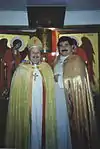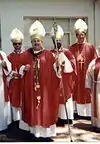Ecumenical Catholic Church
The Ecumenical Catholic Church (ECC) is a small Christian denomination, mainly oriented toward the LGBT community. It adheres to a conventional Catholic Trinitarian theology, professes the Nicene Creed, and considers Jesus to be the Son of God and redeemer of humanity, uniting Christians through Baptism and the Eucharist. Its liturgy is also similar to that of the Roman Catholic Church, but it is independent and not under the jurisdiction of the Vatican or the Roman Catholic hierarchy; it is thus considered to be one of the Independent Catholic Churches. It is also considered an offshoot of the Brazilian Catholic Apostolic Church.[1] While the ECC shares core Christian beliefs with the Roman Catholic Church and many Protestant and Orthodox denominations, it is much more liberal on many social issues.[2]
History
The Ecumenical Catholic Church was founded in Santa Ana, California in 1987, The first edition of its canon law being completed and ratified on January 11, 1987.[3](p. 27). It was incorporated in California on March 10, 1987.[4]
"The ECC grew out of the Californian founder’s experiences in two larger churches: the Metropolitan Community Church (MCC) – an LGBTQ-focused church – and the Episcopal Church. For founder Mark Steven Shirilau, the latter church was not fully inclusive to people in same-sex unions due to its understanding of marriage, while he also found the MCC’s lack of a full sacramental, episcopal dimension unsatisfying. An authentic ‘gap’ was therefore identified and the ECC was born."[5]
The first public service (at St. John Ecumenical Catholic Church) was held on September 4, 1988, at the home chapel of Fr. Mark Shirilau and Deacon Jeffery Shirilau in Santa Ana. Nine persons attended.[3](p. 30) Robert Oscar Simpson became the first person baptized in the Ecumenical Catholic Church on July 10, 1989, in his house in Los Angeles. Robert died of AIDS a few days later.[3](p. 30)
Apostolic Succession

"The ECC traces its roots through several other small ICAB offshoots. Its lineage of bishops sits within the vast dynasty of Castillo Mendez."[6] On the Feast of Pentecost, May 19, 1991, Father Mark Steven Shirilau was consecrated bishop by Donald Lawrence Jolly (an Independent Catholic bishop) at the bishop's home chapel in San Bernardino, California.[7] At the same service, Deacon Jeffery Shirilau, a non-ordained deacon of the Metropolitan Community Church, was ordained to the diaconate by Bishop Donald. Bruce David LeBlanc, a community college professor, became the first priest ordained by Bishop Shirilau. He was ordained on July 27, 1991, in Pocatello, Idaho[3](p. 35). LeBlanc was later consecrated bishop and served Holy Spirit Ecumenical Catholic Church in Davenport, Iowa before becoming the founding bishop of the Transformational Catholic Church.

Growth
The ECC grew rapidly across the United States in the early 1990s. In 1994 regional deans were appointed, and on July 8, 1995, the four deans were consecrated as bishops by Bishop Mark Shirilau at an ordination liturgy held at the First Congregational United Church of Christ in Santa Rosa, California. The four new bishops were Robert Wayne Martin of Oklahoma City, Oklahoma, Michael Robert Frost of Plattsburgh, New York, Denis Armand Martel of New Orleans, Louisiana, and Richard John Cardarelli of Hartford, Connecticut. At the same liturgy the new bishops presented and vested Bishop Mark with a pallium and proclaimed him archbishop; the pallium was a personal gift to Archbishop Mark from Bishop Daniel James Dahl of the Inclusive Orthodox Church in Honolulu, Hawaii. Archbishop and Primate Mark Shirilau unexpectedly died January 12, 2014, while on an episcopal visit in Sicily. Following his sudden death, the Council of Bishops named Bishop David John Kalke to succeed him as Archbishop and Primate and the ECC's headquarters relocated to Guadalajara, Mexico.
References
- Edward Jarvis, God, Land & Freedom: the true story of ICAB, Apocryphile Press, Berkeley CA, pp 169-170
- , www.ecumenicalcatholicchurch.org
- Shirilau, Mark, History and Overview of the Ecumenical Catholic Church: The First Ten Years, (1995. Riverside, CA: Healing Spirit Press, ISBN 1-881568-07-5)
- "Archived copy". Archived from the original on 2010-04-02. Retrieved 2012-11-28.CS1 maint: archived copy as title (link), California Secretary of State Website, Corporation number C1581615.
- Edward Jarvis, God, Land & Freedom: the true story of ICAB, Apocryphile Press, Berkeley CA, p 170
- Edward Jarvis, God, Land & Freedom: the true story of ICAB, Apocryphile Press, Berkeley CA, p 170
- , www.tboyle.net, an online directory of independent Catholic bishops.
External links
- Ecumenical Catholic Church (Spanish)